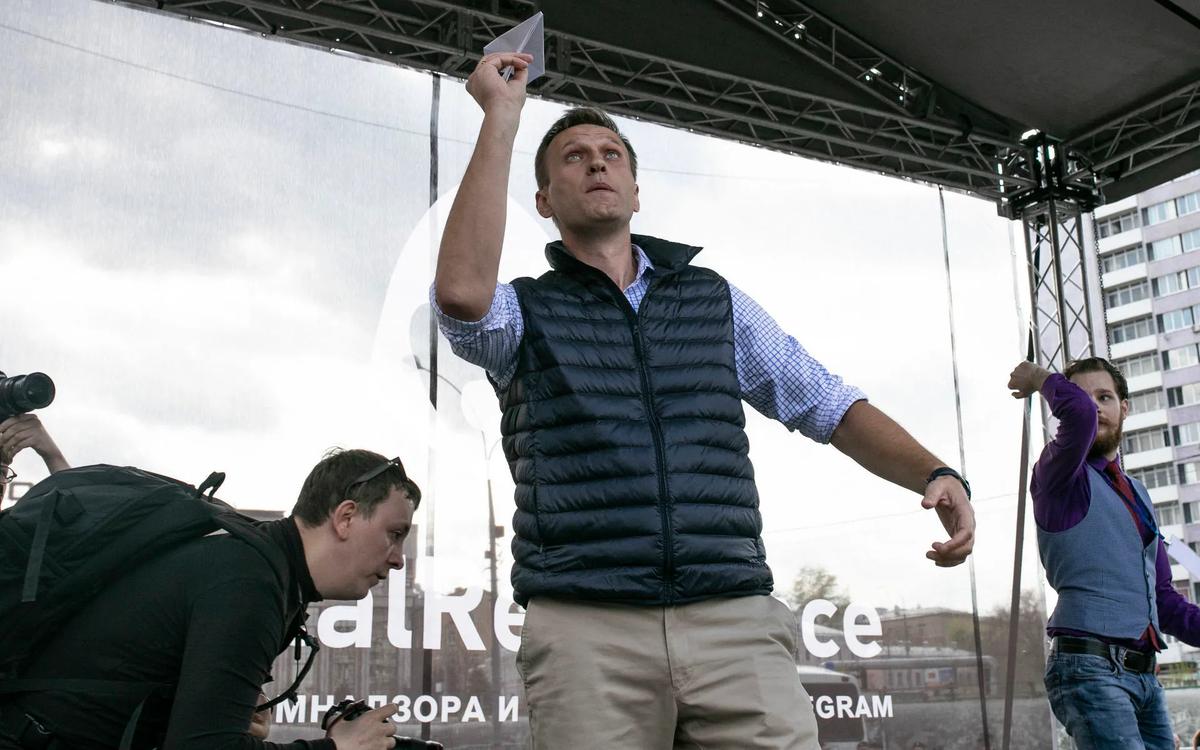This Week’s Highlights
The pandemic locks tens of thousands of labor migrants in makeshift camps inside Russia — we visit one of them to report on the awful conditions; with the first wave of covid-19 barely over, the country braces for the second Covid-19 wave and local officials roll out extreme shutdown measures; plus, pensioners in annexed Crimea are forced to fight for what the state owes them.
Want to get the full story? Click the links below for full-length articles in Russian.
Migrant Covid-19 Camps, Explained
Russia is keeping its borders tightly shut due to a still mostly unmanageable Covid-19 outbreak. In the process, it has wrecked the lives of millions of labor migrants in the country. Six months into the pandemic, many still can't get back home, and some remain stuck in temporary camps. The life of a labor migrant in Russia has never been easy, facing discrimination, exploitation, and often racism. But what our reporter Olga Putilova saw in one of the migrant camps not far from the border with Kazakhstan was too much even by Russian standards.
'WE HAVE PREGNANT WOMEN HERE. DO YOU EXPECT THEM TO DELIVER JUST LAYING ON THE GROUND?'We visited a makeshift camp for labor migrants three kilometers from the city of Kinel in Russia's Samara region, next to the border with Western Kazakhstan. Officials set it up months ago, and thousands of Uzbek citizens live here in squalor, waiting for their turn to go home. Just recently, special transfer trains and airplanes started shipping migrants back home. Yet every day, hundreds of new migrants arrive. The living conditions are terrible.
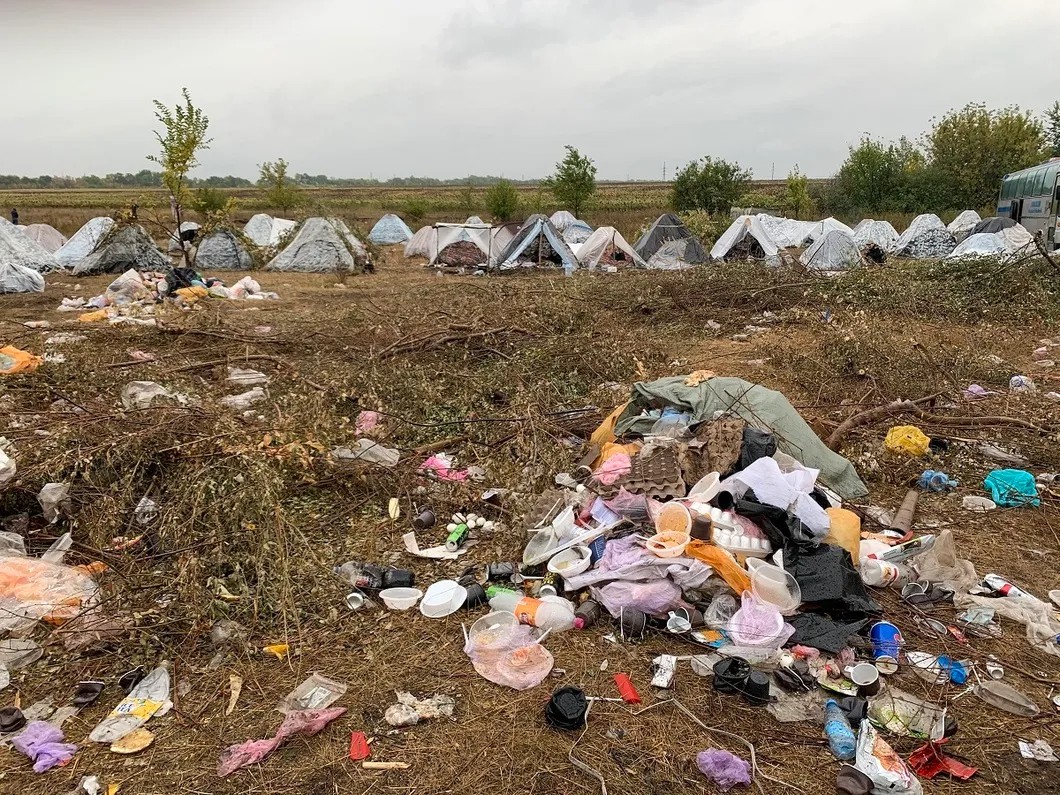
THOUSANDS, INCLUDING KIDS, ELDERLY AND SICK, LIVE IN MAKESHIFT TENTS.Migrants cook their food over fires when it's not raining. They've set up a shower and toilets for the camp themselves. Officials supply drinking water, but it's unclear who is in charge of delivering essential goods and sets the prices. There's no electricity. Folks use portable generators to charge their phones, but they are not free. Garbage is everywhere, and nobody's sure if it ever gets picked up. Masks are nowhere to be found.
WINTER IS COMING.There are currently around 6,000 people living in the temporary refugee camp, and new people are continually arriving. Everyone who arrives here gets a number that will determine when they can leave. 4 trains are expected to arrive at the end of September. Each can accommodate between 860 to 920 people. With the cold weather moving in, it's clear that those who remain behind will need to be moved somewhere warm. But no one knows where that will be.
How can I live here when the cold starts? Will I freeze completely? I used to work in the suburbs, but they fired me when the virus hit. Why would I go back there? I don't even have a place to live, one migrant at the camp told Novaya Gazeta.
SO DOES CORRUPTION.Leaving the camp quickly seems like an unrealistic dream for most. Still, people have started showing up offering to add "your person" to the waiting list of those allowed to leave for a fee of around $400, or 30,000 rubles. Our local administration source said that the Uzbek consulate should make a list, but no consular officials have shown up. The people running the camp's administration have to do everything themselves.
CRAMPED CONDITIONS.While we were in the camp, a man pointed us to a tent with a woman and a small child. "How many of you live here?" we asked. "There are 10 of us. My grandmother lives here with us; she is 68 years old," the man replied. The grandmother, Raisa, starts to thank us. "Thank you, thank you, just write that we have to leave," she says to Novaya Gazeta.
NOT AN ISOLATED CASE.Camps similar to the one we visited in Samara are spread out across the region, in Eastern Europe, the Caucasus, and in Central Asia, as migrants wait for an opportunity to return home amidst the pandemic. For example, in the Russian Republic of Dagestan, Azerbaijani migrants are similarly living in tents as they wait to go home.
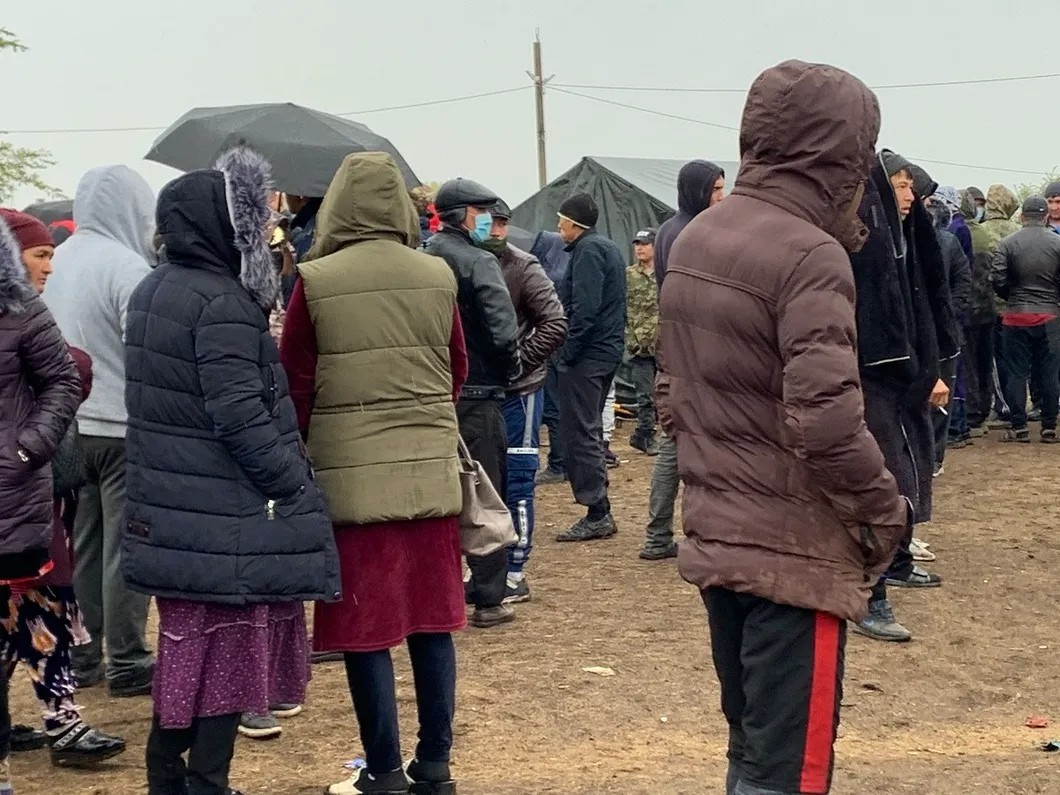
BACKSTORY.Migrant workers make up a sizable portion of Russia's workforce. In 2019, there were 19 million foreigners officially working in Russia. And that's only those with legal documents. According to some estimates, some 60% of migrants are in the country illegally. Despite their contribution, Russian authorities are notorious for their mistreatment of labor migrants. The majority of migrant workers come to Russia from former Russian colonies in Central Asia, where poverty remains widespread.
Read our full report on the Uzbeks refugees in Samara here.
Russian Second Covid-19 Wave. Already Mismanaged
Covid-19 hit Russia harder than almost any country in the world. Six months into the pandemic, incompetent officials' botched responseleft the country still struggling to manage even the first wave. This week, we look for warning signs that the upcoming second wave's official management won't be any better. Our special correspondent Ivan Zhilin reports from in the Ural region of Bashkortostan (thesite of a recent environmental uprising) where local officials are rolling out questionable quarantine measures with no scientific backing whatsoever.
NAVIGATING IN THE DARK. Bashkortostan's authorities shut down five districts and two cities, allegedly anticipating a second wave of the coronavirus pandemic. Anyone driving through these districts who don't live in the areas is obligated to pass without stopping. Around 570,000 people are living in the area. Officials introduced extra harsh measures, although the region has significantly fewer new infections than in neighboring areas. So why is that?
ОFFICIALLY, IT IS 'BECAUSE OF MIGRANTS.' The measures are officially linked to hundreds of labor migrants camping in the region and awaiting a chance to travel back home. As in the Samara story covered earlier in this edition, they are housed in tent camps. Still, it's unclear what role these migrants play in the spread of Covid-19, especially since there have been no confirmed infections among them.
Поддержите
нашу работу!
Нажимая кнопку «Стать соучастником»,
я принимаю условия и подтверждаю свое гражданство РФ
Если у вас есть вопросы, пишите [email protected] или звоните:
+7 (929) 612-03-68
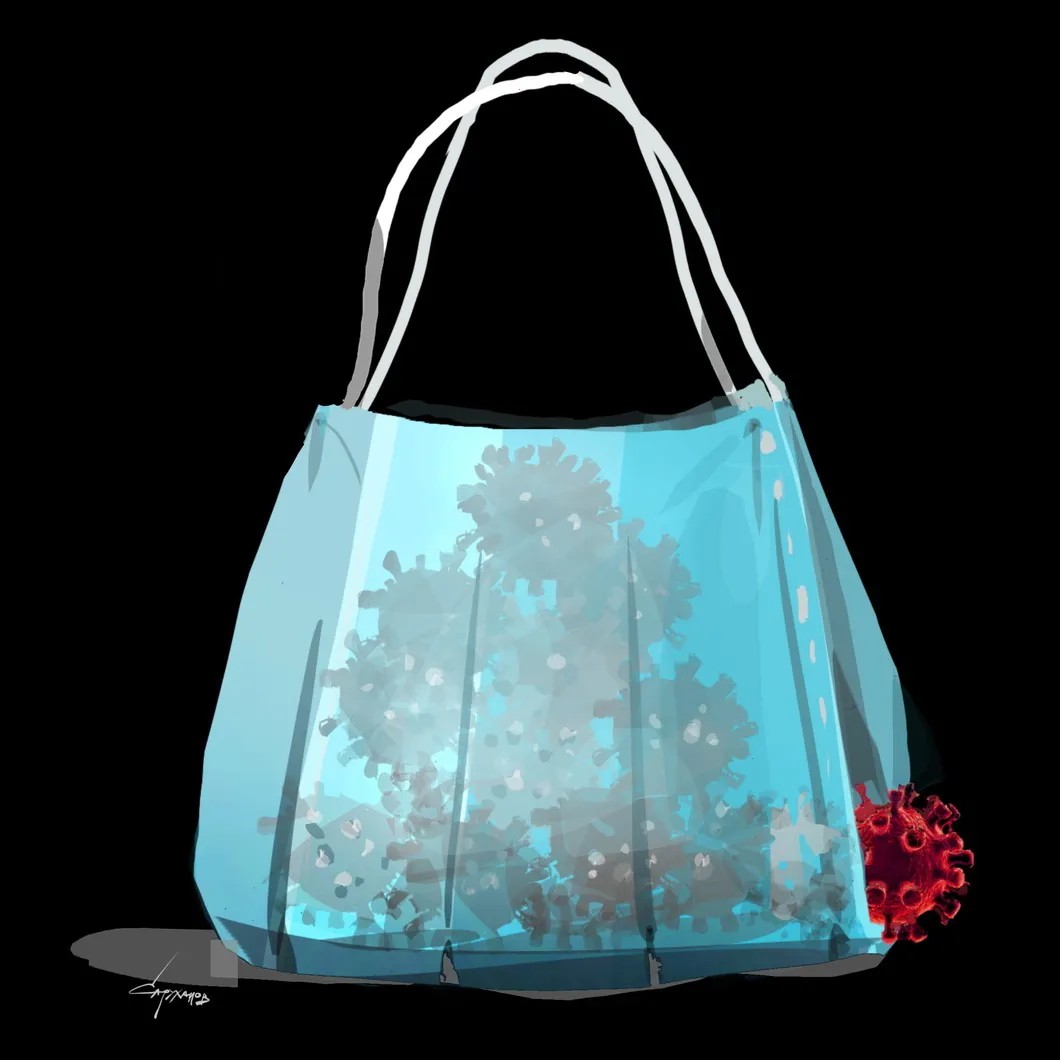
IN REALITY, IT IS BECAUSE THERE'S NO ACCURATE COVID-19 DATA, and no one really knows how many cases there are. Governors across Russia have been rolling out their own restrictions, including mask mandates, in response to fewer available hospital beds. But because they cannot rely on official government statistics, their response has been chaotic and lacking clear logic. In general, local leaders can't make informed decisions without reliable government data.
THE SECOND WAVE IS ALREADY HERE. The situation in Russia is far from homogenous. Still, around the country, the number of confirmed Covid-19 cases has started to grow. The same as during the first wave, Russian officials keep downplaying the severity of the pandemic and refusing to call the spike 'a second wave.' Nevertheless, the country has between 5,000 and 6,000 new daily cases over the last 11 days. That's more cases than in August when the threshold was at 4,000 and 5,000.
BACKSTORY. Russia had one of the largest Covid-19 outbreaks globally. Still, official statistics aren't always the most reliable indicators of the situation. Novaya Gazeta initially found relatively reliable data in only about 10 regions, most of them with low infection rates. Our data analysis unit looked at other indicators to assess the severity of the epidemic, for example, whether the number of online searches for coronavirus-related symptoms has risen.
Read our overview of the world’s second wave of covid-19 infections here, and our report on the shutdowns in Bashkiria here.
Pensions Debacle in Annexed Crimea, Explained
We keep covering the fallout from the Russian annexation of the Ukrainian region of Crimea. In previous editions, we highlighted the land wars and ongoing persecution of the Crimean indigenous people. This week our Crimean correspondent Ekaterina Reynikova looks into the fight of Crimean pensioners for what the state already owes them.
'PHANTOM' PENSIONS.Over the past 6 years, local courts have heard around 1,500 cases brought by people who did not receive their pension. It happened because the country's Pension Fund can't confirm how many years they worked when Crimea was a Ukrainian region. After analyzing publicly available court documents, we found that Russia's Pension Fund often rejects the official workbooks (a document that records an individual's work history) issued by the Ukrainian authorities. The reasoning is often obscure or based on mere technicalities — smudged writing in the documents or the individual's work experience wasn't 'properly recorded.'
HOSTAGES IN A CONFLICT.After rejecting a pension claim, Russian authorities often ask Crimean claimants to obtain additional Ukrainian government confirmations. The latter stopped responding to such requests years ago, despite that technically they come from Ukrainian citizens. The Russian bureaucracy also refuses to be flexible. It is bureaucratic limbo that leaves many without their legally-earned pensions.
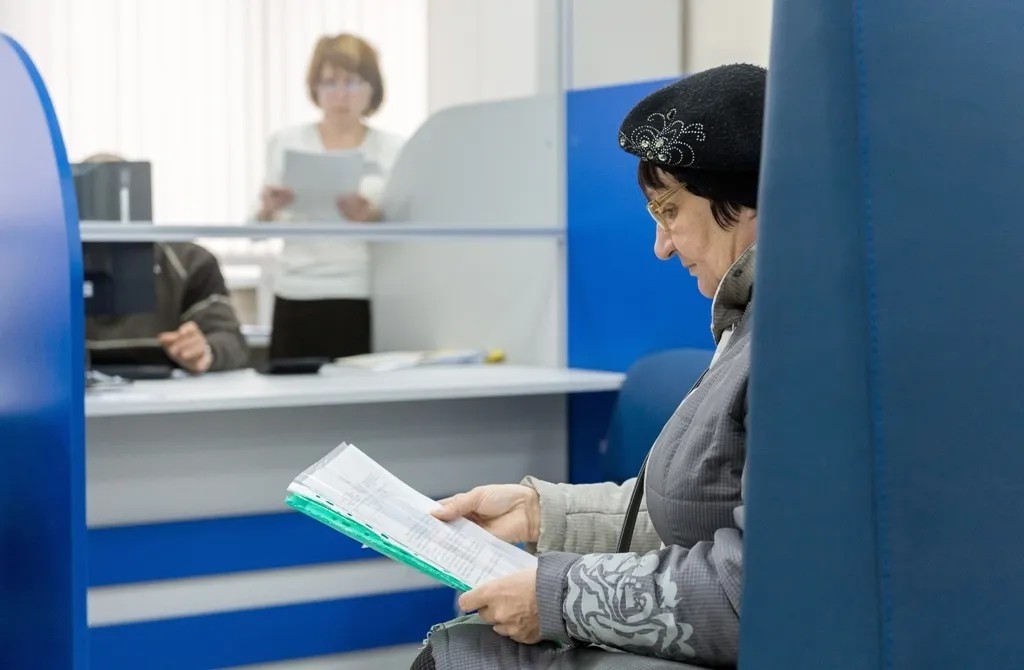
"The Pension Fund sent a formal request that needs an official response. But the Ukrainian side doesn't respond to requests from Crimea," Vladislav Romanovich, a resident in the Dzhankoy region of Crimea, told Novaya Gazeta. "Of over 30 years of my work experience, they only counted 11. That means I don't have the right to a pension."
THE SELF-EMPLOYED ALSO SUFFER.Another group with the same trouble is the self-employed, private entrepreneurs, and their employees. Alexander Vnukov, who is originally from Yalta, requested his pension in January of this year. But after he'd organized all of his documents, it turned out that he didn't have anything to show for the years he worked as the director of a private company in the resort city of Yalta, when Crimea was under Ukranian jurisdiction. Russia doesn't recognize any of the salary deductions made by Ukraine's Pension Fund at the time.
"It's documented in my workbook that I was the director from 1996 to 2014," Vnukov told Novaya Gazeta. "But my salary and all of the obligatory payments are recorded in Ukraine."
A LACK OF REGISTRATION.Another common reason people being denied their pensions is that they weren't officially registered in the region at the annexation time. It is usually done with a special stamp in the passport called 'propiska' — a relic of the Societ authoritarian state. In March 2014, all Crimea residents who had 'propiska' stamp got Russian citizenship almost automatically. But unlike in Russia, 'propiska' is barely enforced in Ukraine, and many folks live without it, including in pre-annexation Crimea. Now as a result, some Crimeans who have never even left Crimea aren't eligible for a pension because they don't have the official seal.
Read our full report on the bureaucratic obstacles faced by pensioners in Crimea here.
Other Top-Stories Russia Has Been Reading
- SANCTIONS FOR THE CORRUPT:Members of the European Parliament (MEPs) are calling for new EU sanctions against the corrupt individuals who opposition leader Alexei Navalny exposed in his investigations. A botched attempt on Navalny’s life recently thrust him into the international spotlight and gave more weight to his anti-corruption activism. The new sanctions mechanisms would freeze the European assets of corrupt individuals who were exposed by Navalny’s Anti-Corruption Foundation. If this proposal is implemented, it would completely change the rules of the game for the Russian ruling elite that keeps storing most of the wealth abroad.
- RUN ON THE RUBLE:Another top story popular with our readers this week is about the strength of the ruble. Navalny’s poisoning coincided with another dip in the value of the Russian currency. Today, 76 rubles are worth one dollar. That’s a far cry from the 28 rubles to the dollar value of the year 2000, or even the 56 rubles to the dollar of 2014. Two main factors are causing the trouble: the threat of new sanctions on Russia and the possibility that the Nord Stream 2 pipeline, which would bring Russian gas into Germany, could be scrapped in response to the poisoning. The value of the ruble could climb back up after the political fallout subsides, but economists tell us that the overall downward trajectory will likely be sustained due to a variety of other factors.
Thanks for reading!To keep up with Novaya Gazeta’s reporting throughout the week, you can follow us on Facebook, Twitter, Instagram, and Telegram. Our video content is available on Youtube and don’t forget to visit our website for the latest stories in Russian.
— The Novaya Gazeta Team
Поддержите
нашу работу!
Нажимая кнопку «Стать соучастником»,
я принимаю условия и подтверждаю свое гражданство РФ
Если у вас есть вопросы, пишите [email protected] или звоните:
+7 (929) 612-03-68
